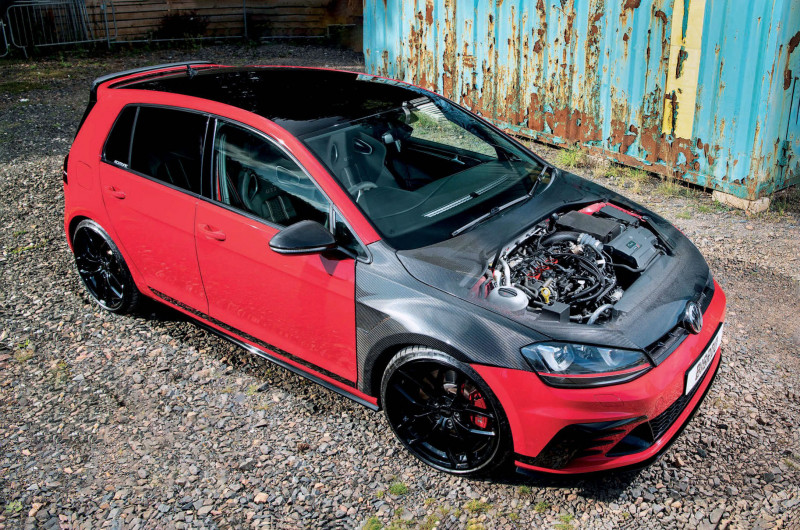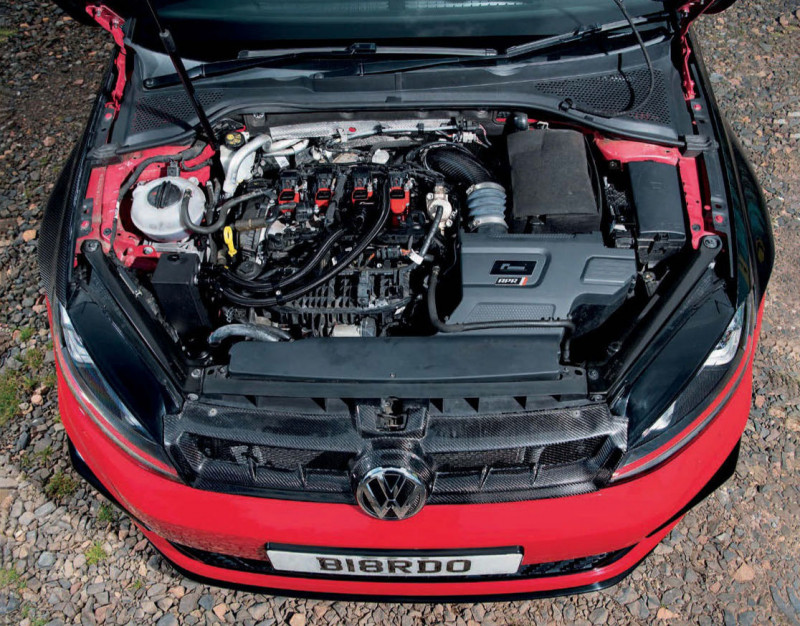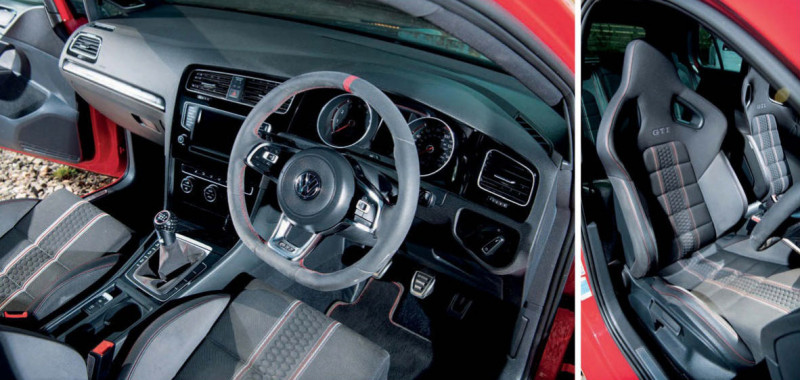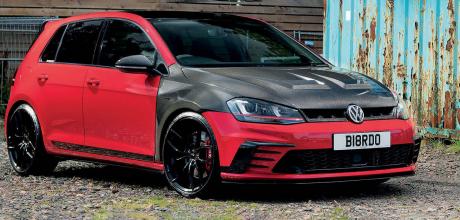Chris Baird’s carbon-clad 510hp 2016 Volkswagen Golf GTI Clubsport Edition 40 Mk7
More than half way through the Golf GTI’s fifth decade, and Chris Baird’s carbon-clad 510hp Volkswagen Golf Clubsport Edition 40 Mk7 shows the hot hatch bloodline still has plenty of tricks up its sleeve…
510bhp Mk7 CLUBSPORT
Ecotune GTI Clubsport running 510bhp through the front wheels & 468lb/ft torque
Words: Alex Grant
Photos: Ade Brannan
As 40th birthdays go, most of us could feel a bit envious of the Golf GTI. Instead of taking it easy, the original performance Volkswagen stormed into its fifth decade with an uncharacteristic show of force. This was an anniversary marked by the GTI’s first season competing under TCR rules, and a little of that motorsport engineering propelling the 310hp GTI Clubsport S to a Nürburgring lap record a few weeks after its headline reveal at Worthersee. A reminder from Wolfsburg that the trailblazer could still cut it.

Edinburgh-based Chris Baird was in the right place to pick up on that hype. As the GTI turned 40 back in 2016, he’d been taking a break from the building trade to indulge in a life-long love of cars. Working at a local Volkswagen showroom didn’t turn out to be the perfect fit – it lasted about a year before he returned to running his own business – but the Clubsport-branded residents of that forecourt left a lasting impression. “My wife wanted a Tiguan R-Line, but I got lucky finding this one,” he says, smiling. “It came up just after I’d left Volkswagen, and at a good price, so I thought I could hold onto it for a few years on a PCP and maybe lose three or four grand on it. I bought it without her knowledge and convinced her it was a good car to have after it was on the doorstep. She wasn’t happy…”
«I’m kind of the Fast and Furious generation, I’ve always been into my cars and I’ve had spoilers and exhausts on most previous ones»

«A lot of people don’t want to see a halfcoloured car, but it’s a good talking point»
Traditionally a big market for hot Golfs, the UK got a more than its fair share of the 400 GTI Clubsport S production run, and all of the 150 right-hand drive cars sold before they reached showrooms. However, the Clubsport Edition 40 wasn’t much of a compromise. Built as a numbered batch of 1,000 cars, it got most of its stablemate’s aerodynamics and performance – 290hp on overboost from an engine that was closer to the R than the regular GTI – but without the aggressive track-ready weight reduction. Dealers ran out of stock within weeks.

Chris wasn’t wrong about spotting a good one. Despite having a couple of extra doors, number 453 had been specced as close to the Clubsport S as the Edition 40 options list allows. A mix including the manual gearbox, black roof and the same Recaro wingback seats that kept Volkswagen test driver Benny Leuchter pinned during that record-setting Nürburgring lap. They’re not a bad way to spend £1,350.
“It was good fun but, unless the tyres are really warmed up, it struggled to get grip at the start"
It settled in quickly. “I’ve had a Mk5 Pirelli Edition and a Golf R before this one,” he explains. “You do notice the lack of four-wheel drive when you pull away – with the Clubsport you have to work it a bit harder to avoid wheelspin. However, because it’s about 100kg lighter, it’s better for throwing around and, when you get that grip, it takes off really quickly. I could see there was potential.”
Three years of finance payments forced some patience into the project. With a works van for daily duty, the Golf put in a shift as an out-of-hours runaround for Chris and his wife until temptation eventually kicked in at the start of 2020. Fuelled by a little encouragement from his mate Davie at Autohaus in Edinburgh, the Golf reached its third birthday with an APR Stage One kit. Software and a freer-flowing air filter unlocked 360hp and that all-too-familiar curiosity for going deeper, but it also started highlighting the GTi’s weaker points.
“A lot of petrolheads want the manual, because they want to feel like they are actually driving the car,” he continues. “Davie warned me that I’d probably find the standard clutch would start slipping, and he was right, it slipped constantly. I did a couple of hundred miles and it was basically a pointless exercise getting the map without upgrading the clutch. But, with the RTS clutch and flywheel, I’m not getting any bother even now I’m at Stage Three.”
The manual ‘box has its work cut out. There’s no launch control option, nor mechanically assisted shifts of a DSG to help deliver that extra power, and it wasn’t only the clutch that needed to be upgraded. The APR short-shift kit tucked in under the centre console, helps avoid movement while the Golf is doing its thing, while also offering tighter gearshifts and two-axis adjustment of the lever itself. A useful upgrade which was dulled a little by the almost immediate arrival of Covid-19 lockdowns shortly afterwards. This turned out to be an opportunity to develop those plans further: “Suddenly we weren’t going out, spending a lot of money on eating, drinking, holidays and that sort of thing,” he says. “That meant I had a few quid to spend on wee bits and bobs for the car, to see if it made a difference. I’m kind of the Fast and Furious generation, I’ve always been into my cars and I’ve had spoilers and exhaust and stuff on previous ones. But they’ve never been to this extent.”
Stage Two came about with the help of APR’s UK stockist, Awesome GTI in Manchester, and Glasgow’s Ecotune to get everything on to the car. Despite the pandemic-disrupted postal service, the summer months put a line of deliveries in the direction of the Golf, including the uprated ignition coils, FMIC, boost hoses and a full Milltek exhaust system. The Clubsport S might have had a 100kg weight advantage, but the injection of new hardware gave Chris almost 100hp more to play with, though it didn’t quite satisfy that all-too-familiar curiosity for going even further.
It’s a sign of the times that, without any internal engine upgrades, a five-door family hatchback can thump out 510hp on forecourt fuel. Stage Three adds a re-worked version of the stock IHI turbo, balanced, enlarged and flow-optimised by TheTurboEngineers, then paired with RacingLine’s OE-quality, 600hp-rated airbox with its cold air intake stretched across the entire width of the grille. Custom Ecotune management then takes care of delivering easy road manners, while wringing out the full potential of every component once that extra boost comes into play.
Plans for track use mean caution has been dialled in throughout the build. Although Clubsport models benefitted from the GTI TCR’s racecar’s development programme, Volkswagen stopped short of fitting its oil management system. RacingLine offers an aftermarket equivalent; a baffled catch can with a breather plate that stops oil pooling at the front of the engine under heavy braking, which can cause starvation issues and vapours getting into the cylinders. Chris also opted to upgrade both fuel pumps, as there’s really no room for error when you’re pushing the limits of factory internals.
The smile on his face suggests the dynoproven 510hp, 468lb/ft pay-off was worth the effort: “I don’t think I can go much further with the power, the turbo is limited to 535hp, but it’s like a 500hp go-kart the way it goes around corners. With two-wheel drive and a manual, you’ve got to try and control that, or it spins in second and third.”
Pursuing lap records means Volkswagen hadn’t spared any expense either. The Clubsport GTIs share a front bumper optimised to improve cooling airflow, with a front splitter, side skirts and open tailgate spoiler to press each corner into the tarmac. Chris left most of that alone, adding an ECS Tuning carbon rear diffuser and carbon fibre mirror caps similar to the Mk7.5 GTI TCR. The bonnet and wings were imported from Jason at Seibon – and stretch the body about 10mm per side, requiring spacers up front.
It’s a tough look, and covering that carbon weave was never on the cards: “Some folks will hate it, and some will love it,” Chris continues, with a shrug. “A lot of people don’t want to see a half-coloured car, some people think it’s a wrap, but it’s a good talking point either way. A lot of people say they haven’t seen it before.”
On the subject of wheels, those RacingLine R360s aren’t just a cosmetic upgrade. They’re built in a Mk7-friendly ET44 and come in at 10.9kg a corner – or about 2kg less than what’s fitted at the factory – and the Michelin Pilot Sport 4s are the same 235/35 fitment as the Clubsport S. Well, if it works for Volkswagen Motorsport, it’s not a bad place to start.
Of course, the downside of building during lockdowns is a reduced number of opportunities to really explore that potential. Track time came about fairly recently, with the Ecotune-sponsored German Invasion event at Crail Raceway not far from Edinburgh. Already in the area for an overnight stay with his wife, it felt like a useful chance to discover what the Golf could muster. It’s been a learning curve. “I hadn’t been to Crail since I was 25. The car was running Stage Three but I hadn’t really driven it properly – on track, or quarter mile – so didn’t really know how to get the most out of it. But I thought I’d give it a blast down there,” says Chris.
“It was good fun but, unless the tyres are really warmed up, it struggled to get grip at the start. My quarter mile times were mid to high 12s, a car like mine should be doing high 11s. There were RS3s and Golf Rs topping out at a lower speed but getting faster quarter mile times. I had the highest speed but not the fastest time, it just wasn’t getting the good start it needed. Once it gets to third gear it pulls like a train.”
Predictably, that curiosity has fed back into other improvements. The hard-working front wheels are now wrapped in Nankang AR-1 semi-slick tyres to give the Golf a better a chance of putting the power down effectively, and Chris added a solid dogbone mount to dial out any powertrain flex under heavy launches. It’s taken the weekend toy even closer to the track machines that influenced it at the factory. “If you’re used to driving luxury cars, it is a bit noisy. That performance mount means the engine and gearbox are bolted together for the track – so you get quite a lot of noise and vibration through that. There’s a top one too but that’ll be even louder, so Al’s said if you’re not purely tracking it then just leave it alone,” says Chris, adding that he’s not had much luck with trying its touring abilities either.
“Covid killed the road trips too. I was meant to be doing the Cannon Run from London to Amsterdam – it was bought and paid for, then it was cancelled ten days before the event because Holland wasn’t allowing UK visitors. Seemingly this year it’s going ahead but I don’t want to count my chickens just in case. I would like to get back to Crail to see what difference the semi-slicks make, but the weather hasn’t been great for that yet either.” The weather hasn’t stopped play entirely, though. There’s a mildly-tweaked 2018 RS3 sharing the Golf’s driveway space, its four-wheel drive traction better suited to all-season use north of the Scottish border, if not entirely capable of the raw aggression of its platform-shared housemate. It’s a pairing only potentially threatened by another legacy of growing up in the 2000s – an unsatisfied need for something Japanese.
“I’d like to keep it, but if someone came to me with a good price, who knows,” he says. “Before Covid I was looking at R32 and R33 GT-Rs, but with the prices as they are now they’re out of my league. I’m not paying £40- 50,000 for cars that were low to mid twenties two and a half years ago. So I’m going to put that on the backburner and hope the market crashes. We’ll see.”
In the meantime, it seems the original performance Volkswagen isn’t slowing down any time soon. Four and a half decades into the GTI bloodline, and the Mk1’s legacy is still breaking barriers in the performance stakes — and that’s something most of us can feel a little envious of.
Carbon hood lets those in front know all is not as it should be when they look in the rear view mirror. It's the equivalent to a 'Move Over' sunstrip.
DUB DETAILS
- ENGINE: 1984cc, four-cylinder, turbocharged (CJXE), Ecotune Stage 3, Racing Line R600 air filter, APR carbon intake pipe, APR turbo inlet, The Turbo Engineers — TTE535 Hybrid IS38 turbo, APR Turbo muffler delete, APR intercooler, APR silicone boost hoses, APR boost tap, Forge blow-off valve, Milltek full race exhaust system and sports decat with black tip, APR ignition coils, NGK competition spark plugs, Autotec high-pressure fuel pump, Precision Raceworks low-pressure fuel pump, Racing Line oil management system, APR adjustable short shifter and side shifter, RTS clutch and flywheel, solid dogbone mount
- CHASSIS: APR -20mm springs, Forge 13mm wheel spacers (front), 19x8.5 ET44 Racing Line R360 wheels, 235/35 Nankang AR-1 (front) and Michelin Pilot Sport 4 (rear) tyres
- EXTERIOR: Seibon DV-Style carbon fibre bonnet, Seibon 10mm carbon fibre wide wings, ECS carbon fibre diffuser, carbon fibre mirrors, factory black roof
- INTERIOR: Factory Recaro Clubsport wingback seats, factory alcantara steering wheel SHOUT: Davie and the guys at Autohaus Edinburgh, Al at Awesome GTI, Ecotune Scotland


